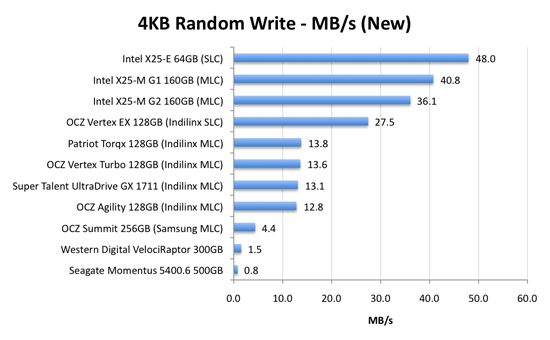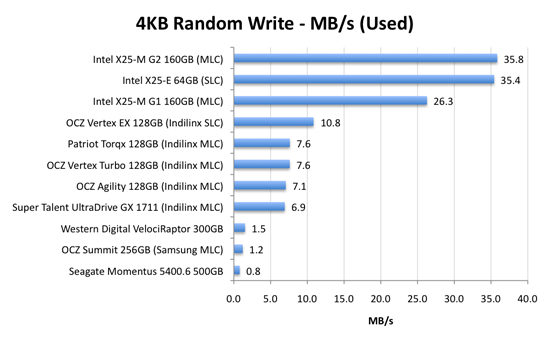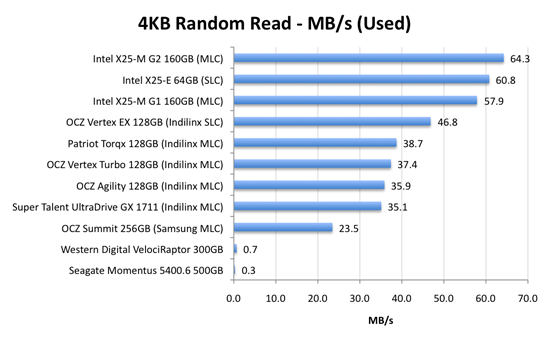The SSD Relapse: Understanding and Choosing the Best SSD
by Anand Lal Shimpi on August 30, 2009 12:00 AM EST- Posted in
- Storage
Random Read/Write Speed
This test writes 4KB in a completely random pattern over an 8GB space of the drive to simulate the sort of random writes that you'd see on an OS drive (even this is more stressful than a normal desktop user would see). I perform three concurrent IOs and run the test for 3 minutes. The results reported are in average MB/s over the entire time:

As we established in previous articles, the disk operations that feel the slowest are the random small file reads and writes. Both of which are easily handled by an SSD. A good friend of mine and former AnandTech Editor, Matthew Witheiler, asked me if he'd notice the performance improvement. I showed him the chart above.
He asked again if he'd notice. I said, emphatically, yes.

Now this is super interesting. Intel's X25-M G1 drops from 40.8MB/s when new down to 26.3MB/s in a well used state. Unfortunately for the G1, it will never get TRIM and will spend more time in the lower performance state over the life of the drive. But look at what happens with the X25-M G2: it drops from 36.1MB/s to 35.8MB/s - virtually no performance is lost. In fact, the G2 is so fast here that it outperforms the super expensive X25-E. Granted you don't get the lifespan of the X25-E and the SLC drive should perform better on more strenuous random write tests, but this is a major improvement.
The explanation? It actually boils down to the amount of memory on the drive. The X25-M G1 had 16MB of 166MHz SDRAM on-board, the G2 upped it to 32MB of slower 133MHz DRAM. Remember that Intel doesn't keep any user data in DRAM, it's only used for the remapping, defragmenting and tracking of all of the data being written to the drive. More DRAM means that the drive can now track more data, which means that even in the heaviest of random-write workloads you could toss at it on a normal desktop you will not actually lose any performance with the drive in a used state. And this is the drive Intel has decided to grant TRIM to.
The G2 is good.
The Indilinx drives do lose performance here. They drop from roughly 13MB/s down to 7MB/s. We're still talking ~5x the speed of a VelociRaptor, so there's no cause for alarm. But it's clear that even Indilinx's SLC drive can't match Intel's random write performance. And from what I hear, Intel's performance is only going to get better.
This is what the X25-M price premium gets you.

Bahahaha, look at the hard drive scores here: 0.7MB/s and 0.3MB/s? That's freakin' terrible! And that's why your system feels so slow when you start it up, there are a ton of concurrent random reads and writes happening all over the place which your hard drive crunches through at roughly 0.5MB/s. Even the Samsung based OCZ Summit manages a significant performance advantage here.
The Indilinx drives all cluster around the 30 - 40MB/s mark for random read performance, nothing to be ashamed of. The Intel drives kick it up a notch and give you roughly 60MB/s of random read performance. It's a noticeable improvement. As our application launch tests will show however, loading a single app on either an Indilinx or Intel drive will take about the same amount of time. It's only in the heavy multitasking and "seat of the pants" feel that you'll have a chance at feeling a difference.










295 Comments
View All Comments
jengeek - Wednesday, September 2, 2009 - link
As of 09-02-09 from Toshiba Direct:80GB = $243
160GB = $473
http://www.toshibadirect.com/td/b2c/adet.to?poid=4...">http://www.toshibadirect.com/td/b2c/adet.to?poid=4...
http://www.toshibadirect.com/td/b2c/adet.to?poid=4...">http://www.toshibadirect.com/td/b2c/adet.to?poid=4...
gfody - Thursday, September 3, 2009 - link
nice thank you, ordered mine from herescrew Newegg! :D
jengeek - Wednesday, September 2, 2009 - link
Both are G2, in stock and ship the next dayBoth are retail box including the installation kit
Best price I've found
ARoyalF - Sunday, September 13, 2009 - link
Thank you posting that!I was going to wait out that awful price hike over at the egg.
You rock
ElderTech - Tuesday, September 1, 2009 - link
It's difficult to imagine the amount of time and effort that went into this article, Anand. Just the clean installs of Win7 took a fair amount of extra effort, let alone the other detailed diagrams and testing involved. From an old technology advocate over many years of working to keep pace with Moore's Law in a variety of research environments, your site provides the most satisfying learning experience of all. A sincere thank you!PS: As for the availability of the G2, it pops in and out of stock at a variety of online retailers, including Newegg, of course, as well as MWave. Both had it available for a short while at $249, Newegg on Friday and MWave today, Monday. However, it's out of stock presently as of midnight, EST 9-1-09 at both, with MWave still at $249 but Newegg going from there to $279 over the weekend and now at an amazing $499! OUCH. Sounds like supply and demand gouging if the price holds when they are next available! There is also some stock available in the distributor channel from small Intel Partners, as I confirmed by calling around the Chicago area. You might give this a try tomorrow. Good luck!
blyndy - Monday, August 31, 2009 - link
You really got performance anxiety because some high-profile people/sites liked your article and linked to it? It's hardly like it got printed in some prestigious science journal and the publishers are waiting on a follow-up.It was just the first time that SDD operation had been detailed in plain english from a reputable website.
Enough of this 'anthology' nonsense, I don't care if it's 1 page or 20, just tell me how some of the new SSDs perform (eg OCZ, Western Digital). You've already detailed how they work so now I want to know which ones do/will support TRIM and some details on the controller. Nothing to get anxious about.
Anand Lal Shimpi - Monday, August 31, 2009 - link
Indeed I did get performance anxiety after the last one, I even got it after the first X25-M. It's not so much the linkage, but the feedback from all of you guys. I received more positive feedback to the last SSD article than any one prior. More than anything I don't want to let you all down and I want to make sure I live up to everyone's expectations.As far as your interests go, all three manufacturers (Indilinx, Intel and Samsung) have confirmed support for TRIM. When? I'd say all three before December.
Take care,
Anand
cacca - Thursday, September 3, 2009 - link
Dear Anand i really thank you for your SSD articles, the improvements in this area seem tangible.Can I ask you to test Fusion-IO & ioXtreme, i am really curious to see how this other approach performs.
I know that isn't a perfect apple to apple comparison but at least we could compare the per $ performance.
Best regards
Ca
vol7ron - Monday, August 31, 2009 - link
Good article.I have a follow-up question regarding your size suggestion.
In more words you say, "get the size you need," but don't these drives perform that much better in a RAIDed system?
The cost per GB isn't that much more if you're looking at getting a 160GB Intel drive, to get the 2x 80GB instead.
SSDs are more reliable than HDs and you have the benefit of more RAM. 2x 32MB for an SSD in RAID0.
Curious to hear your thoughts,
vol7ron
StraightPipe - Tuesday, September 1, 2009 - link
Since RAID cards aren't going to support TRIM commands for a while, I'd stick with a large, single SSD.Anybody ahve any experience running these cards in RAID? I'd love to put some of these in my server, but i'm terrified of lossing data through the complexities of RAID combined with SSD.
I'd love to do a simple RAID1 setup, but it looks like i may be better of waiting too.
In the mean time, these look like a mean machine for an OS disk.